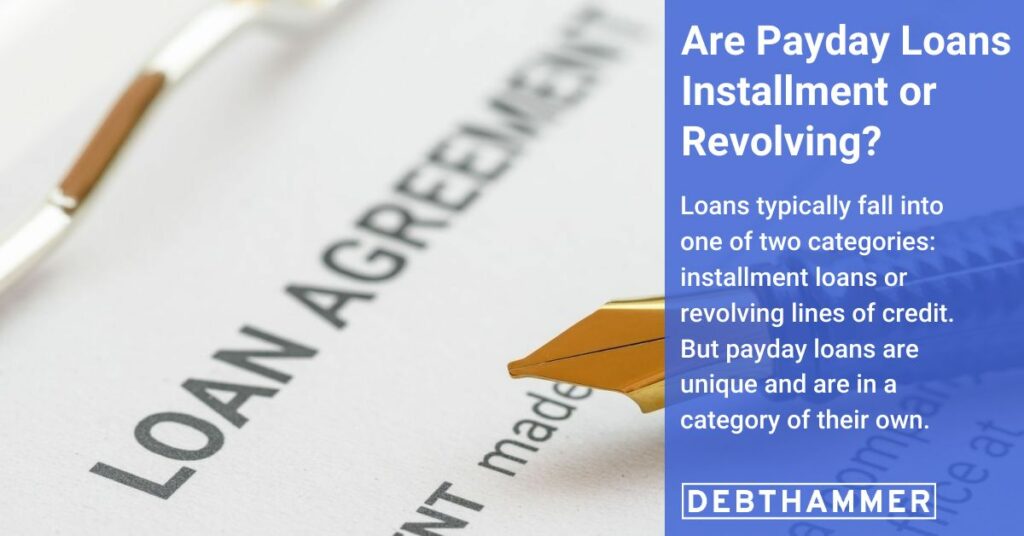Loans typically fall into one of two categories: installment loans or revolving lines of credit. This affects how the loans can be used and repaid.
But payday loans are unique and fall into a third category. If you’re thinking about taking out a payday loan, it’s important to understand the type of loan you’re getting.
Table of Contents
Our take
- Payday loans are not installment loans
- They’re also not revolving lines of credit
- With payday loans, the full amount must be paid on the due date and the money can’t be reborrowed unless you apply for a totally new loan
- Payday loans are dangerous, so it’s best to rule out all better options first
Payday loans are not installment loans
An installment loan has a fixed loan amount and a fixed repayment schedule. Many types of loans are installment loans. This includes:
- Personal loans
- Student loans
- Car loans
- Mortgages
Installment loans require borrowers to repay the amount they borrowed (plus interest) over time. The payments are usually equal installments. How long they have to repay the loan depends on the loan terms.
For example, with a 30-year mortgage, a person makes monthly payments over the course of 30 years. Most installment loans are shorter than 30 years, though. A car loan might be paid over five years, or a personal loan might be repaid over three years.
Since the full amount of a payday loan must be repaid from a borrower’s next paycheck rather than in incremental installments, payday loans are not installment loans.
READ MORE: Pros and cons of payday loans
Payday loans are not revolving lines of credit
While installment loans let people borrow a pre-set amount, revolving lines of credit let people borrow money as needed.
Pro tip: Credit cards are the most common examples of revolving loans. Home equity lines of credit (HELOC) are also common.
With a revolving loan, a borrower usually has a credit limit, such as $1,000 or $10,000. They can borrow against that amount but don’t have to use all of it (and really, aren’t encouraged to use all of it.) A borrower only has to repay what they borrow, plus interest. Usually, they must make at least a minimum payment each month.
How much a person borrows against a revolving credit line gets subtracted from the limit. After they pay the amount charged, the limit resets and a person can borrow up to the full amount again.
Pro tip: Credit cards are revolving lines of credit.
Payday loans are not revolving lines of credit. Payday lenders allow you to borrow a fixed amount of money repaid in full on the due date. You cannot repeatedly borrow and repay the same money. Instead, if you need to borrow again, you must apply for a totally new loan.
READ MORE: Are payday loans secured or unsecured loans?
Credit scores matter for traditional loans
Eligibility for installment loans and revolving lines of credit is based on your credit score.
With both installment loans and revolving lines of credit, a borrower’s credit score and credit history affect the loan’s interest rate and terms. Borrowers with bad credit will pay more than borrowers with good credit scores. Payday loans are different. Their interest rates are presented as a fee for every $100 borrowed.
Pro tip: When you pay a $15 fee to borrow $100 for two weeks, that equals an annual percentage rate of 391%.
That’s very high when you consider that the interest rate for most installment loans averages about 12% and typical interest rates for a revolving line of credit range from 10% to about 29%.
READ MORE: How to get out of payday loan debt
Credit scores don’t matter to payday lenders
And payday lenders don’t care about your credit score. All you need to qualify is proof of income, an ID and a bank account.
READ MORE: How payday loans affect your credit score
Better alternatives
A payday loan can seem like a quick way to get cash when a person needs it. But the loans are expensive. The lenders charge high interest rates and are difficult to pay off. If someone needs money ASAP, there are better options out there.
- Secured credit cards: Secured credit cards are revolving lines of credit designed to help people with low credit scores build up credit. They require a borrower to put down a deposit as collateral.
- Payday Alternative Loans: Credit unions offer PALs to people with low credit scores. They usually charge interest rates up to 28%. A PAL is a type of installment loan. Borrowers typically have between one and 12 months to repay what they borrowed.
- Cash advance apps: Sometimes called a paycheck advance — these are similar to payday loans and are neither installment loans nor revolving lines of credit. Most cash advance apps are free to use, though some charge a small membership or monthly fee.
READ MORE: Payday loan alternatives
The bottom line
Payday loans are in a category of their own. They aren’t installment loans, but they also aren’t considered revolving lines of credit. They are, however, particularly dangerous for borrowers since many people can’t come up with enough money to repay their loan in full on their next payday.
DebtHammer can help
If you have a payday loan you are struggling to repay, help is available. DebtHammer goes after predatory lenders to help you smash your debt. Contact us today to get started.


